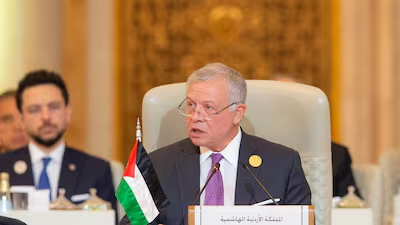King Abdullah II of Jordan vowed to protect his country from regional tension following Iran’s strikes on Israel, during which Jordanian forces intercepted several missiles and drones launched by Tehran.
“Jordan’s security and sovereignty are above all considerations,” a Royal Hashemite Court quoted the king as saying in a speech to community leaders in the northern Mufraq province on Tuesday, stressing that the “protection of Jordanians comes above all else”.
“Jordan will not be a battlefield for any party,” added the king.
Iran last weekend launched an unprecedented attack on Israel when it fired a barrage of missiles and drones. Jordan shot down some that flew over its capital Amman, with Jordanian Foreign Minister Ayman Safadi saying the kingdom believed the projectiles posed “a real danger” to its territory.
Jordan, about half of whose population is of Palestinian origin, is also a close US ally and signed a peace treaty with neighbouring Israel 30 years ago.
It was among a group of nations, also including the US, UK and France, that shot down the missiles, rockets and attack drones launched by Iran and its allies at Israel.

Jordan stressed its aim was to protect its own sovereignty rather than defend Israel.
“I think [the king’s] message is very clear. Jordan is defending its territory and sovereignty. It's ready to take action to do that though we don't want to be in the middle of any conflict,” Amer Al Sabaileh, a Jordanian geopolitical analyst, told The National.
Mr Al Sabaileh said he expects the king to increase his visits to different cities across the country in the coming days to ensure Jordanians of the kingdom’s efforts to maintain stability amid volatile developments among its neighbours.

“I think talking to internal social forces and visiting cities sends a clear message, as well to the people, that the stability and the unity of the internal front is the major issue and the pillar on which the Jordanian strategy today is built,” he said.
Following Jordan’s interception of the drones and missiles, Iran – which labelled its attack an act of self-defence after a deadly Israeli strike on its Syria consulate – warned Jordan it could be “the next target”, a military source was reported as saying by Iran's Fars news agency.
Jordan's Foreign Ministry summoned the Iranian ambassador and demanded that Tehran stop “questioning” its positions.

Mr Safadi insisted that “if the danger had come from Israel, Jordan would have taken the same measures”.
Earlier on Tuesday evening, the official spokesman for the Jordanian Armed Forces confirmed that the Royal Jordanian Air Force began increasing its air sorties to “prevent any air penetration” and defend Jordanian airspace.
“This measure confirms Jordan's firm position not to allow the use of Jordanian airspace by any party for any purpose, given the infringement it constitutes on Jordanian sovereignty, and what may threaten the security of the nation and the safety of its citizens,” the spokesman said.
Israel has been heavily scrambling GPS this past week inside its territories, as well as over its neighbours Lebanon and Jordan, to diminish the ability of attack drones to navigate and reach its targets in Israel.
The National has verified using several phones that applications such as Google Maps and Uber showed users in Jordan appearing in Cairo as of Wednesday.
“Those in the West claiming that Arab co-operation in downing Iranian drones is evidence of an emerging patchwork of an Arab-Israel missile air defence system or a common Arab-Israeli front against Iran are either wishful thinkers or, even worse, spinning this incident for PR,” Nasser bin Nasser, a Jordanian political strategist, said on X.
The Israeli spins on Jordan and Saudi Arabia intercepting several drones were clear when Israeli news websites were quick to publish reports that regional Arab neighbours had actively taken part in helping them.
Informed sources denied reports that Riyadh had participated in the interception of Iranian drones during the attack on Israel, Saudi news channel Al Arabiya reported.





